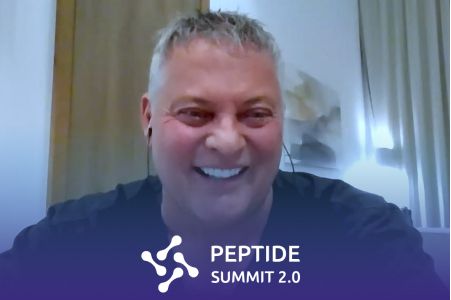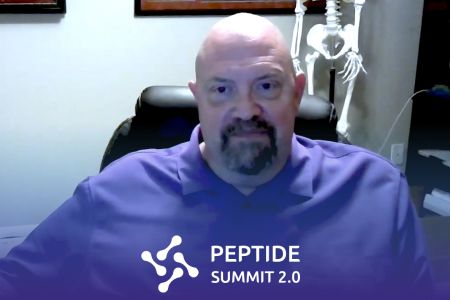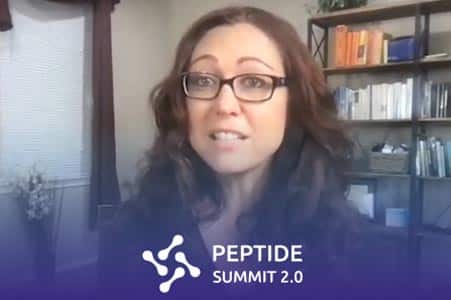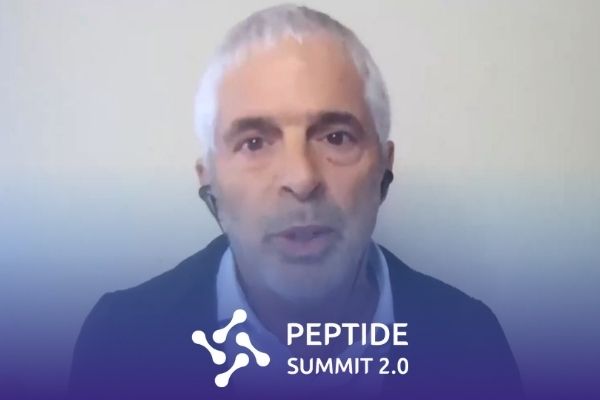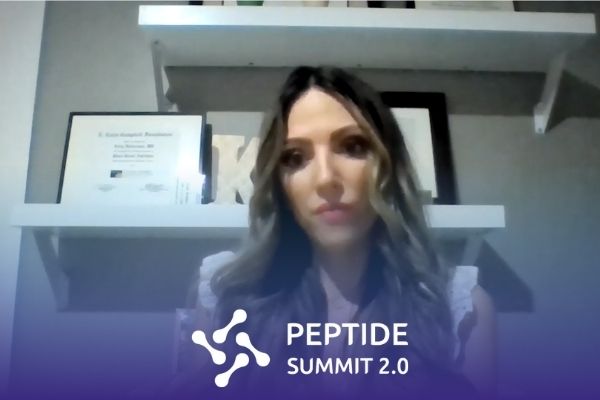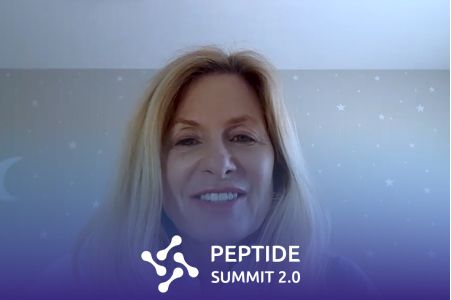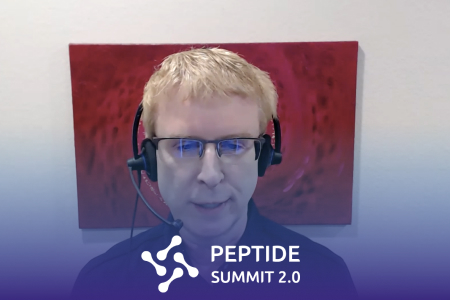Join the discussion below

Dr. Cook is President and Founder of BioReset® Medical and Medical Advisor of the BioReset® Network. He is a board-certified anesthesiologist with over 20 years of experience in practicing medicine, focusing the last 14 years on functional and regenerative medicine. He graduated from the University of Washington School of Medicine... Read More
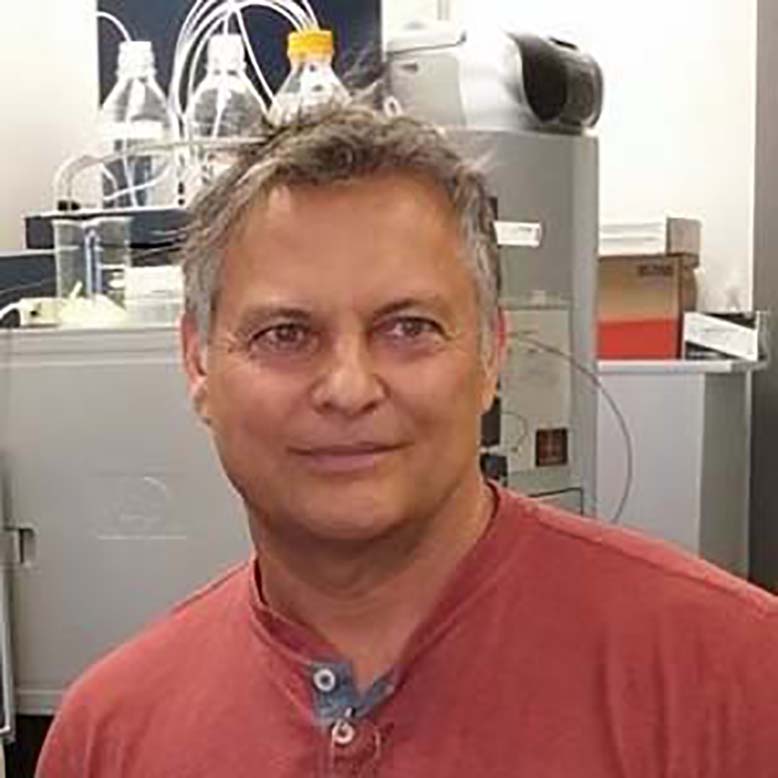
Jean-Francois Tremblay, MD, CM, FRCPC, FAACS
Jean-Francois did his undergraduate studies in Biochemistry, Mechanical engineering and Kinesiology. He then pursued his graduate studies in pharmacy to finally complete a master degree in pharmacology. His interest in peptides and their applications started over 20 years ago. He has consulted privately since then for anti/healthy aging, sport performance... Read More
- Description of bioregulators.
- Use of bioregulators.
- How can they be used therapeutically.
Related Topics
PeptidesMatthew Cook, M.D.
Hello, and welcome to the “Peptide Summit.” Today is probably one of my most exciting, actually, the most exciting “Peptide Summit” that we’ve got for this sequence is with my good friend, Jean Francois, and we were introduced by our great mutual friend, Charles Poliquin, who introduced us. And he told me, and I just remember, just hours of laughing and being with him, and he was just such a wonderful, incredible person, and all of the things that he did. And he told me, “I have a friend, and you need to meet him, and he’s gonna be a great friend, and you need to know more about peptides,” and that was four years ago. And so then he introduced us. And honestly, that was probably the greatest introduction that anyone ever gave me, because I’ve learned so much from Jean Francois. It’s basically been one of the highlights of my medical practice, and he’s an incredible source of information. I talk to him all the time, and we’re coming together and we’ve founded The International Peptide Academy. And so if you want more of the two of us, you can come see us in Florida in June. So we’ll get all the information on that to you, but welcome to the summit, Jean Francois. I’m delight to have you.
Jean-Francois Tremblay
Hey, thank you for inviting me. It’s always a pleasure.
Matthew Cook, M.D.
So you’ve just been a wonderful resource for the world and the universe on peptides. How did you get into peptides?
Jean-Francois Tremblay
Oh, boy, that’s… I told that story so many times I already.
Matthew Cook, M.D.
Give me the one minute version.
Jean-Francois Tremblay
Okay, the one minute version. I was white like a ghost when I was, all my life, back beginning of the end of the nineties. In the French magazine, I read about Melanotan, this investigation that was made, and I say, “Oh.” Couldn’t get it at the time. It was way too expensive. Would’ve been like $1,000 a day. So I didn’t get it. But that kind of opened my eyes on that and other compounds that came after. So it was purely aesthetical at the time.
Matthew Cook, M.D.
Oh, interesting. And so then now we’ve moved and evolved into sort of all of these new areas. And so then I thought we’d just kind of get in to talking about peptides and stuff like that. One, I would say, theme that’s a intriguing theme for both of us, is that basically peptides are sequences of amino acids. And so then there are some peptides that are quite long and big that will have certain active fragments, and then there are other peptides that are just a fragment of a bigger peptide that is the active segment, or very small peptides. And interestingly, thematically, what I found, and you told me this, and then you told me it was gonna be true, and then it was 100% true. People respond better to the smaller peptides, in general. They tend to have less side effects. They tend to have less mast cell activation. So tell me a little bit about that, and then I thought maybe we’d get into talking about some of the fragments of Thymosin beta-4 and history of that and how you think about it.
Jean-Francois Tremblay
Yeah. Okay. Big, many times. It’s funny. Again, because that brings back to your first question. I know peptides, they have been used for decades, actually. You know me, I kind of come from that subculture of, well, bodybuilding. I was not a bodybuilder, but I coached them, I trained with them, I’m just not good at it. But like, those time isn’t beta-4, BPC, we have known about them for a couple of decades already. They were used. And in that subculture in sports, there is nothing new about them. Now in medicine, for most people, and mostly, well doctors, it’s like, “Oh, peptides are new.” And no, they’re not that new. It’s new that you just learned about that, basically. So when I was working at the beginning with athletes, I wouldn’t see side effects like mast cell activations, because I’m always careful when I say side effects from peptides. It’s a bit like, if somebody is allergic to peanuts and he gets a reaction if it’s peanuts, nobody’s gonna talk of the side effects of peanuts, right? The problem is not with the peanut, it’s with the person’s condition.
So I see that more with peptides too. Intrinsically, they don’t have side effects per se. We produce them in the body. And if they had side effects, we’ll be sick all the time, I guess, from those side effects. But many times, and that’s what brings me to that reaction from bigger peptides, is that sometimes when the body senses, and that’s the immune system, basically, that senses a protein that is there, there is too much of it. It’s one of its way to kind of bring it down is to produce antibodies to that peptide. It doesn’t work. It works well in the sense it causes inflammation, it causes problems. And many times with bigger peptides, those side effects won’t be mast cell activation or immune system response. It’s just that it’s a big molecule that is not usually there in those quantities, and the body may or may not produce some antibodies. By the way, if you have an antibody reaction, it doesn’t mean that the peptide is eliminated or inactivated. It’s still working the same, except you don’t feel too good for a couple of days, and then you can get used to it, or stop and wait for a few days, start again, and you’re good. It’s a bit weird.
But you see that with like, the biggest, the big, big peptides. With the smaller one, well, actually one fraction of Thymosin beta-4, and Thymosin beta-4 actually activates mast cells. If you work, like in my case back then with athletes, with healthy people, in general, then you won’t see that mast cell activation, because there is a threshold, so to say. You can activate the mast cell up to a degree and you won’t have any bad effects. But now if you take… And that’s what happened in the last years of my consulting, I met more and more people with conditions. If they are already have a condition where they’re prone to mast cell activation and it’s like on the edge, then a peptide like Thymosin beta-4, that usually doesn’t provoke a mast cell activation problem. It may be the drop that makes the glass spill, and bang, you have full-fledged mast cell activation from the peptide.
Matthew Cook, M.D.
And then that I think is also, because traditionally, you’re… And I had so many Olympic athletes that I took care of that Charles sent me. When you have somebody that is an Olympic athlete and a professional bodybuilder, these people are pretty healthy and they don’t have hardly any problems, and then their immune system is basically working great. When you take the same molecule and then you apply it to people with chronic Lyme and mold, and basically, all of the problems today of our era create immune dysregulation. And mast cell activation is one of those things that goes along with immune regulation. And I’m gonna guess it’s more mast cell activation than antibodies, just because if it was antibodies, it would persistently keep coming back, whereas mast cell, it just kind of comes and goes. But then generally, all of our strategies are somewhat oriented towards regulating that immune response. And interestingly, one of the ways to regulate those immune responses is with some of the fragments of Thymosin beta-4. So maybe-
Jean-Francois Tremblay
Yeah, and another one, Thymosin alpha 1 too, that is a great regulator of the immune system, basically. Well, they’re both, they come, they are called Thymosin alpha 1, beta-4, because they came from the same protein, the thymosin protein, that comes out from the thymus, our immune system gland that kind of gets smaller as we age. And if you live long enough, it’s gonna disappear. So it comes from there. So even though they have very different activities, at the same time, they kind of have, but to different degree. For example, Thymosin beta-4 modulates the immune system, but no way near the extent that Thymosin alpha 1 does it. And the other way around, Thymosin alpha 1 is actually a good repair peptide, and actually in the nerves repair reanimation before Thymosin alpha 1, and different ratios are really good, but to different agree. So depending on the condition, you have to choose. But they both come, and there is much less known. There is thymosin beta-10 and thymosin beta-15, but they do have some activity, but it’s so specialized that nobody… You look at it and you say, “Well, no, I don’t need that.” So it never came out as part of any therapy.
So this is it. And Thymosin beta-4 in particular, is amazing. And the more I learn, because every there are new articles, the more it’s like, whoa, it’s almost, it’s a God-given peptide. It does pretty much everything. There is that researcher last year, he published an article, and not exactly, but the title was “How Thymosin Beta-4 Makes The Heart Cells Remember Their Native States,” like when they were in the womb, I guess, native, so at the most healthy level, not used. So Thymosin beta-4 does that. And the guy have done many research on Thymosin beta-4 with the heart, and it was kind of a enlightenment for him, because when you read the conclusion, in one part of it he say, “Oh, that could be an antiaging peptide, and oh, maybe there are more of those.” Like, it’s a lab guy. He has been working with that molecule for years and suddenly he has that, “Hey, that could be used for other things,” and it’s a bit refreshing to read that article, actually. And the way we found Thymosin beta-4 to work, is it’s kind of a keychain, where you have different keys on your keychain, and every key opens a different door. So beta-4, it’s pretty much the same.
There is one fraction of it. One part of it that is anti-inflammatory. And another part that it’s another key that it’s the healing section. So some researcher, they broke down Thymosin beta-4 like in a bunch of fractions, maybe like 50, you know, 1 to 3, 1 to 6. Well, I guess, first, they looked at naturally it breaks down and they looked at each of those fractions, what they do. And they isolate that four fractions with very, very specific activities, and that opened the door to a new approach to use Thymosin beta-4. Because now it gives you the opportunity, knowing that it has so many activities, but you may not always use Thymosin beta-4 for all its activity. Maybe you’re interested in the inflammatory aspect of it. So it turns out that just a small fraction of Thymosin beta-4 is the anti-inflammatory. So you don’t need to use the full molecule. And there are some advantages of using the smaller one.
Matthew Cook, M.D.
Like segment one, four.
Jean-Francois Tremblay
Yeah. That’s a segment one, four. And one of the main advantage, as you said, it’s the fragment one, four, it’s only four amino acids versus 43. That means that per milligram, and I made a calculation, you get 10 times more molecules per milligrams than Thymosin beta-4. So you get 10 times the punch, the anti-inflammatory punch, you won’t get the rest, but if you’re looking for anti-inflammation, bang, so in a very small amount, you get a huge anti-inflammatory response. And so far, I’ve seen, I think it’s probably the most potent anti-inflammatory I’ve seen, milligram for milligram, it dwarfs all the other one. It’s really, really good.
Matthew Cook, M.D.
And also quite good for hydropsyche. Very good around nerves.
Jean-Francois Tremblay
Yeah, of course.
Matthew Cook, M.D.
Yeah, and-
Jean-Francois Tremblay
That’s part of what you do, and you’re the one who can talk about that.
Matthew Cook, M.D.
But then, also anti-inflammatory is gonna be a huge part of antiaging, right?
Jean-Francois Tremblay
Listen, they talk, they found nine pathways to aging, and da, da, this and that. Yeah, and there are probably more, but at the end of the day, out of the things you can control, there are only two things that are vital to control as we age, and that can precipitate the aging if you don’t. It’s your glycemia that needs to be under control, and your inflammation. Only those two things. Keep that under control, you’re gonna feel good for long time. So now of course, you could use the peptides to decrease that inflammation, but it would be a good idea to look at the causes of the inflammation, in particular, for particular individual, of course. And that’s gonna bring us to the bioregulators. I’m a strong believer… To talk about antiaging, we are programmed to die, basically. Nature has two options for immortality, either you never die, or you reproduce. So on this planet, reproduction was chosen. It comes down to that for nature. Nature doesn’t want us to eat our children’s food. So once we as a species, we poor created, then for us, it’s time to go, and that’s program into us. And so that’s what you see, basically. And it’s Ben Greenfield who mentioned it in one of his conference, and it was like, whoa. The day you cannot reproduce, for nature, you become useless. So time to go. Comes down to that. It’s what they say, “Nature is cruel.” But that’s the reality of things.
So anything you do when you’re younger that makes you stronger, right? Good diet. Everything you do. At one point, there’s gonna be a switch in your genetic and coding expression that’s gonna say, “Yeah, but no, all that’s gonna turn against you. It’s gonna begin the dying process.” It’s not like you got, you died from one day to the next, but you start then to accumulate senescent cells, for example. We have senescent cells all our life, circulating, but around 50, 70, they start to accumulate, why? Well, because it’s time to go. So it’s part of the dying process. And so, yes, if you have a great diet, you exercise, you do everything, it’s gonna help, but it’s not gonna save you. You’re still gonna die. And many times we see it, not much older that most people, actually. You will just healthier the time you live, but not longer. And healthier and more functional too. So at that point, my belief is the only way to bypass that is to tweak with your own biochemistry. And so far, the best tool I found for that are peptide.
Matthew Cook, M.D.
So then take me through, you mentioned bioregulators.
Jean-Francois Tremblay
Oh, yeah. Okay, bioregulators. I love them. I won’t extend much because I believe Natalie did a podcast on those, so listening to her podcast should have a good idea. But the beauty of them, and that most, if not all of other peptides don’t do, is that, okay, if you look at a peptide, it has… They’re signaling. They send signals, but they need to touch somewhere. They need to touch the cell membrane, or they have to introduce themselves in the cell membrane and touch something inside or the nucleus to provoke that signalization of something. Well, it turns out the bioregulators who almost by definition, they are 1, 2 to 4, 5 amino acids at most. Where they bind is within the nucleus. They actually bind within the DNA chain. And that’s why they’re small, by definition, because they need to be small enough to introduce themselves within the DNA chain and attached to it. And by doing so, it kind of dilate locally the DNA chain in that spot, which somehow increases the expression of those genes at that position. So basically, what you’re looking at is it’s not genetic manipulation, it’s epigenetic manipulation.
Basically, you go at the core of where it happened, include that peptide, increase the expression of those genes, bang, there you go. It’s not the end of it, but a lot of studies have been done in Russia, Russia, that people. Okay. But anyway, on human, animals, and the results, and I’m sure Natalie talked about it, that study that was done over with 3,000 people, and another one with 6,000, over 6 and 12 years. And basically, all in all the mortality rate was decreased by 67%. And the only difference was they were using two bioregulators, nothing else, no, and people from 60 to 78. So you’re talking much older people already. And I think it was done in Siberia. So with rough conditions, I’m sure nutrition wasn’t optimal. I pretty sure nothing was optimal with those people. Well, just by adding two bioregulators twice a year for 10 days, decreased mortality by 67%. And that’s one thing, they looked at other markers. I don’t remember. I know, like, bone density and melatonin levels and all that, and they looked maybe 10, 12 markers. And basically, over the course of those years, all those markers came back to youthful levels. So-
Matthew Cook, M.D.
I mean, I think Dr. Khavinson is gonna end up probably being what he… I would think of him as probably one of the most important doc. He’s gonna end up being one of the most important doctors like ever to have lived, ’cause it’s so great what he has done.
Jean-Francois Tremblay
It maybe, at the time, it didn’t. Because at the time he was working for, it was the army, and the army, they wanted, look for something to make our soldiers better, same as any country, and he came about those peptides. And I’m sure at the time he didn’t realize, but with the years, that’s almost like 50 years ago. I’m sure now he realizes the importance of his discovery. And that’s another thing. Okay, if you talk about bioregulators, you have, like, over 20 of them known, there’s for sure more. And each one is specific to an organ, right? So epitalon is the pineal gland. Timagene or timalin, the extract is thymus. Then you have the heart one, there are two for the liver. There’s two for the lung and so on so forth. For system or organs, you have a specific peptides.
But then suddenly, there are studies that came up and, oh, it’s not only good for that organ. If we put it in another kind of tissue, it will have a different, but positive effect. So because there is so much, and you can study at the same time, those studies were not done yet, but I’m convinced that actually, all those peptides bioregulators have that strong activity in their mother organs or system. But they have activities in all other organs and systems too. To analyze that, it’s a bit like trying analyze the DNA code or the microbiome, eventually, somebody somewhere will map all that. But I think they even have more reach than what we know so far. I think they’re amazingly, amazingly potent.
Matthew Cook, M.D.
Right now, I would had a phone call with somebody who told me that they were taking bioregulator peptides. And I said, “How do you feel?” And they said, “When I take them in the morning, I take it before I get in the shower. And by the time I get out of the shower, I feel perfect,” which would be an idea, one interesting thing is we’ve always found that what helps really sick people, will help people who are really healthy.
Jean-Francois Tremblay
Oh, yeah.
Matthew Cook, M.D.
Because this is the principle. There’s many things you can give to healthy people that will make sick people horrible, but anything you can give to sick people, will make healthy people fine. And so then interestingly, patients with complex illness do quite well with bioregulator peptides. And then as a model, and then this is just kind of an interesting idea, that with patients with profound immune dysregulation, that’s the result of mold, and or mold in line spectrum, then what they’re finding is that the immune system is dysregulated, but then also though at a genetic expression in terms of what genes they’re printing, it’s dysregulated. In the mold communities, the Dr, Dr. Shoemaker, who’s an amazing doctor also, who basically they’re doing this test, the Genie Test, and it will show that they’re printing kind of the inflammatory genes, and then the idea is you detox these people forever.
And I first found out about this about 12 years ago, and patients are on this long-term detox where they could ultimately take a peptide called VIP, which regulates gene expression, and it regulates those back into a normal. But if you gave it too soon, those patients do terrible. But what my clinical, my strong clinical suspicion is that the epigenetic regulation that you get from the bioregulator peptides regulates genetic expression. And so then if you think about complex illness, then we’re regulating the genetic expression with bioregulators, and then we’re regulating immune expression with immune peptides, and now, that basically rebalances patients with complex illness and gets them feeling better. Now then, essentially, it’s almost exactly the same thing on the antiaging side,
Jean-Francois Tremblay
It is.
Matthew Cook, M.D.
Because on the antiaging side, we have the same thing that those complex illness people have, we just have, like, 10% of it.
Jean-Francois Tremblay
And that’s what you see. And as I said before, as we age, things they go down, but many times, the same way. If you provoke that gene expression through, by taking peptides, then everything comes back to normal. Same thing with growth hormone. We know that your growth hormone levels, they start to decrease at the early 30s. So by age 60, you have, like, almost nothing. But it’s not because the gland cannot produce it, it’s the stimulation of the gland that decreased because you just give a secretagogue, they’re very good peptides for that, and bang, your growth hormone levels are back to youthful levels. It never last, and you could take a 90 years old and it’s gonna happen. The capacity to produce will always be there, it’s the stimulus that goes down. So bioregulators, like everything else, as you grow old, I would say that you, for many reasons, they decrease in yourself. A lot of them, we believe they actually probably come from food, from meat mostly, there are amino acids, so they got to come from, and specific amino acid that you find in meat.
So by breaking down those proteins to polypeptides to smaller peptides, then… We all have read that if you’re sick or if you want… Okay, back, like, thousands of years ago, if you wanted to have courage, you would eat the heart of a lion or an animal, right? And the most sensitive people, but where that it come from? Because the most sensitive people, when they would eat those organs, they would feel that positive effect from eating that organ. So I think that, like, long, long time ago, that side came about, if you eat the liver, you’re gonna have a better function of the liver or whatever. And lately in the last centuries, even that’s why medicine before drugs were invented, a big basis of the pharmacy at the time where gland extracts to cure. It’s funny because I have a good friend of mine here in Montreal.
He used to… They stopped him; Quebec, they’re crazy. The extract of the thyroid gland for hypothyroidism. And I was talking to him, he didn’t know much about, he didn’t know about peptides at the time, it’s at the beginning, but we’re talking about that. And he was telling me, “It’s funny because those clients I have that take the extract of the gland, somehow it takes a couple of years, but eventually their thyroid function improves.” And that doesn’t happen if you take a synthetic one, the T4 by itself, nothing, no, it’s not gonna improve. And I told him, I say, “Well, because that’s the extract. So you get some of those thyroid bioregulator in there and it’s doing what it does, upregulate.
Matthew Cook, M.D.
And so then that’s why I’m a huge fan. And then even Dr. Khavinson, I think would be quite positive. Because those, most peptides, a 43 amino acid sequence. If you eat that, your body’s just gonna start chopping that up and you might get on the four segment. But if you take extract of a gland and it has those little four amino acids in those, you can observe them before they get chopped up.
Jean-Francois Tremblay
That’s what we hope. Yeah. Some of it.
Matthew Cook, M.D.
Yep, that’s what we hope. But then you’d be-
Jean-Francois Tremblay
That’s why I was coming too. That’s a good point, because I forget it… As you grow older, one of the system that start to fail you is the gastrointestinal system, and we know that where you start to have malabsorptions, and you see it with vitamins, for example. Suddenly, you have enough B12 in your diet, but you’re deficient. Older people, they’re deficient in B12 because they don’t absorb it as they used to. So they give them once a week shot and it’s all good. So that’s why it’s a very complex system that is designed to kill us, basically. And part of that system, it’s that malabsorption at the intestinal level of all those things. That’s why the bioregulators, they all exist in oral form, and yes, they’re great, but the question is always the same.
To what degree do you absorb them? It’s like, I heard that from Charles first, many years ago, “You are not what you eat, you are what you absorb.” So basically, to what degree do you absorb it? And now you’re talking older people that probably have a beginning of, or not so beginning of malabsorption. So how much benefits will they get from the oral form? They will, of course some, but it may vary. Are they gonna absorb 80%, 10%, 50%? But per se, they’re amazingly good, but that’s the only thing why I prefer the injectables, because you inject one milligrams, it’s gonna go where it’s gonna go, the full milligram. So you don’t have to wonder about, “Hey, do I get it all?”
Matthew Cook, M.D.
I would totally agree. Clinically, I think I see that, clinically, I’ve seen that. In terms of, if that would be like maybe one of our favorite categories, there’s gonna be another categories that are sort of bioregulator, like these small peptides, like KPV, GHK is kinda interesting.
Jean-Francois Tremblay
Well, it’s funny, GHK in particular, because that one has been known for like, Pickart, the guy has been doing research on it since the 90s. And I recall in one conference, I believe that Khavinson gave, he said, “I wish I was the one who discovered this one.” He loves it. But it doesn’t classify it as a bioregulator because, well, he did discover it. But there is so much studies and it does, it’s a amazing peptide. And you talk, no, we talk about the genetic effect, GHK, one of its action, it repair damaged DNA. So by itself, it’s like, wow, we know some cancer is there. Damaged DNA up to 87% of the DNA is damage. So if you have a peptide that helps to repair that DNA, then suddenly you have a peptide that helps in the cancer therapies. It was shown to have a positive or negative effect on gene expression. Negative, when it’s an effect you don’t want. So you want it to be negative. And positive, effects you want, in more than 4,000 genes at all levels of actions.
We know it’s very well known for the skin, the collagen production and everything, but it’s amazingly good in the healing in the cancer therapies. Pretty much everywhere you look at it, you just do GHK peptide on Google Scholar and you’re gonna have, like, literally hundreds, if not thousands of studies that has been done on that peptide. It’s very well documented. And again, it’s a three amino acid peptide, very small. So probably it does introduce itself like the other, but nobody looked into that. So we can assume, but we don’t know for sure. KPV, same thing. Three amino acids. Probably, it’s hard to say, again, and more so on KPV because it is a really new peptide, only a few years. So there isn’t that many studies showing, like, the deep effect it may have in the body, like the bioregulators, but chances are that it does.
Matthew Cook, M.D.
And clinically, we will see often a decrease in mast cell activation with KPV, and then KPV will have pain benefits. And then like the bioregulators and the like other sort of small peptides, you can take KPV orally. Although, once again-
Jean-Francois Tremblay
No. Again, yeah. It will be absorbed. But okay, pay attention. It does not all depend on the size of the peptide for its absorptions. It depend, is it Lippo sodium so or not? Does it dissolve in water or not? In term of, yeah, if you take it orally at the intestine level, yeah, it’s absorbed. But you know, some people, they use sublingual and they think, “Oh, it’s small. It’s gonna go.” No, it doesn’t work like that. It’s much more than just the size of the molecule. It’s not that there is little holes and if it fits in, it’s gonna go through, no. Usually, those transfer of molecules are done by, how you call it, by concentration gradient. So you have one side of the world, there is more, one side of the other world, there is none, then most cases with peptides.
So because of that difference in concentration, you’re gonna have a transfer to balance, but it has to be able to go through. Otherwise, it would be in the bad shape if everything would go through. And that’s why for… Not because it’s a big one, but because it’s liposolube, and the polarity overall. Testosterone, you take sublingual and very, very little will be absorbed. But there are other medications that are highly absorbed without any problem. Insulin, why it’s much smaller than testosterone? It’s not absorb at all if you take it orally.
Matthew Cook, M.D.
So then speaking of testosterone, when you think about antiaging, and then one of the ways we think about managing that is managing our hormones, be that growth hormone, be that testosterone. There’s a peptide you can take that’ll help with-
Jean-Francois Tremblay
Yeah, it’s kind of new. It’s like Kisspeptin-10. And I love this one. Because the way it works, it doesn’t stimulate the testicule to produce testosterone. It’s gonna produce the rays of LH hormone, not so much LSH, but as a adult, you don’t care. Doesn’t make a difference. 90% plus of the stimulation of spermatozoa and testosterone come from LH, as an adult. As a baby and a infant, yeah, LSH as a much stronger role. But later on in the male aspect of it, LSH is marginal. So it raises LH levels. So as long as the organ, the testicle is functional, it’s a bit like with the growth hormone, then all it needs is that stimulation to start to produce again. So that peptide raises the hormone that brings about that stimulation. At the same time, it can be used as a test to see if the testicle are still functional, because if you pump them up with Kisspeptin-10 and the testosterone level doesn’t go up, that means then the problem is with the organ that cannot produce. And now it’s more that there is a problem there. It’s not normal that when stimulated it doesn’t produce. So then, and that’s why me, testosterone replacement therapy, I’m all for it.
But many times I believe it started too soon, when there would’ve been other solutions. And the only thing I don’t like about the way it’s taken right now, it’s you cut off cycles. I’m a big believer in cycles. We have yearly cycles, we have seasonal cycles. We have month cycles with the moon, daily cycles. So testosterone is a hormone that is secreted. It’s very cyclical during the day. And it works with actually LH. So what happened is usually your highest level of testosterones are in the morning. Then during the day it’s gonna go down, and that decrease in testosterone during the day will provoke an increase in LH in the evening and at night, which will bring an increase in testosterone in the morning, and you have that cycle. So now when you take testosterone straight up the form it’s taken right now, you have sustained levels of testosterone 24/7.
So you basically destroy that cycle. It doesn’t exist anymore. It’s like… And like anything else, okay, that’s been done for a long, long time already, the implication may not be that deep, but I, like, anything, I don’t think testosterone, if it’s cyclical, that’s because it needs to be, you don’t want testosterone floating around all the time, otherwise nature would’ve made us so. So I always believe it’s better to stick. And that’s why I say, before you start to use trade up testosterone and the way it’s used today, better look at, for example, that Kisspeptin-10 and see if you can raise back your testosterone level with that in accordance with the daily cycle so you won’t any bit anything, at the contrary, you’re going stimulate the cycle again to go normally.
Matthew Cook, M.D.
And then strategically, that makes sense to me, because then for those, all of those people that may be early, yeah, alcohol really lowers testosterone.
Jean-Francois Tremblay
Yeah, zinc deficiency.
Matthew Cook, M.D.
Pain medication. People on opioids have no testosterone at all. And so then as you begin, I think that there’s a fairly substantial opportunity for all of those people who are early in the conversation and oh, okay, testosterone is low, okay, can we start to do some things. And then on the antiaging side, those growth hormone secretagogues, I think are real.
Jean-Francois Tremblay
Same, same thing. Same thing with growth hormone. And as you just said, many times that low testosterone is not the problem, it’s just a symptom of a deeper problem. So don’t take it as the problem and just give testosterone. No, why, why is it low? And I’m telling you, because historically, me, I lived many years in South Mexico and parts of South America. And almost like in the jungle parts or in the farms and all that, you see like older men, like 80 years old, and their kids, not his grandkids, his kids, are like four or five years old, the guy in the 70s still had kids, given with a younger woman, needed to. But why does it decrease? It’s all part of that process. So if you can fix that or tweak with it, then you postpone everything.
Matthew Cook, M.D.
Yeah. And you’ve actually were… And interestingly, you think about it, everybody was trying to give growth hormone in antiaging. And now almost everybody has switched to giving peptides. So it’ll be interesting to see what happens along that line.
Jean-Francois Tremblay
Because it turns out you cannot take too much. Well, you could, if you would take like four shots a day of the peptide. But if you do once or twice a day, it’s just gonna raise it back to youthful level, but no more. As if you shot it, you give two IUs. For some people, it won’t be enough. For some people, it’s superphysiological dose. It’s not regulated. As when you use the peptide, you kind of that auto regulation feedback and everything. And it’s actual in a antiaging approach, I’ve never seen somebody have too high growth hormone from taking this secretagogue.
Matthew Cook, M.D.
Yeah, I remember back when I was doing anesthesia, and then people would come in, and I would get that crowd that was doing lot of growth hormone and a lot of testosterone, and then it was a bit interesting, because then basically when you do anesthesia on someone you do, you get, you understand their biology and their physiology, because you’re giving drugs and you’re constantly monitoring blood pressure, heart rate, oxygen, and so minute by minute, you know what’s going on. And it was sort of like that first relatively profound cognitive dissonance that I got when I saw those people who were doing antiaging stuff. But I was like, “Oh, this is not working. These people are the super.” And everything in medicine, there’s gonna be people who believe in a super high dose, medium dose, and low dose, but often, I don’t know what your perspective is on that.
Jean-Francois Tremblay
I believe even with peptide, and you know that in high doses of peptides, but within a therapeutic approach, not preventive approach. Preventive a much more conservative, you take for a few days with long breaks and you don’t need to take much, just a little to get that little push. Therapeutically, same thing with the bioregulators, they’re known to have therapeutic effect but you need to take between five, and in some case 30 times, the preventive dose to have that therapeutic effect, immediate effect, therapeutically. So it’s the same with everything. Testosterone is great, but prevent, know what you would take preventively. So meaning to maintain your youthful levels versus what is superphysiological, and then you start to see all those side effects, heart problems and liver enlargement, organ enlargement, like a bunch of problems with growth hormones too. So yeah, it’s not that there is high dosage is good or bad. It’s in what context you’re gonna use it.
Matthew Cook, M.D.
Now, speaking of antiaging, probably one of the best things you can do for antiaging is gonna be the help with weight loss.
Jean-Francois Tremblay
Oh, yeah.
Matthew Cook, M.D.
So, what’s your thought on GLP?
Jean-Francois Tremblay
Well, okay. I’ve been doing podcasts for a few years now, and I’ve been asked either in the podcast or in some forum on Facebook AIM and all that. What’s the best peptide from weight loss, right? And through this, up to not so long ago, there wasn’t. There are peptides that help. Okay, you need to exercise, you diet, you take those peptides, they’re just gonna facilitate that process you started. But really, like, weight loss peptides, not really. Until recently, there is a new category of peptides that was discovered, the GLP peptides, Glucagon-like peptide, That’s the name. And paradoxically, we, for so many years, we talked that you need to control the insulin, right? And it turns out that it’s a peptide that control glucagon levels that has amazing effect on weight loss. And as I said, I was saying in the past, the day you see me lose weight, that’s because that peptide came about. And well, it did, and I’m losing weight.
It’s pretty amazing, actually. Plus as research, it’s semiglutide or commercially , it’s Dr. Stickler called it Paradigm Change in terms of, it used to be a weight loss expert, and his practice was weight loss. I think he was even doing this surgery, bariatric surgeries. And he gave up on that, he say, “Nothing works.” They lose weight, they gain it back. He got fed up. And now he is back in some weight loss consultation because of that peptide. It’s, oh, it works. What can I say? Class regulator glycemia, it’s even, some people… Because you don’t hear it much, but some people, a few years ago they would call Alzheimer, diabetes type 3. They would think it was related to glucose metabolism in the brain cells. That basically, the brain cells would be diabetic. And it turns out that peptide works in the brain too, at that level. So if somebody was to develop Alzheimer for that reason, then that would prevent it.
Matthew Cook, M.D.
However-
Jean-Francois Tremblay
If that is the real reason somebody did up Alzheimer. But so far, it’s only good things, only good things about it. Very little, very little side effects. If it’s well dozed then you don’t see anything, and it can be used long-term. I don’t know, it’s a great peptide.
Matthew Cook, M.D.
And then, I love that you mentioned type 3 diabetes being dementia, because that’s like the two things we have to regulate is blood sugar and inflammation.
Jean-Francois Tremblay
That’s why me, I’m not a doctor, I cannot tell people do this. But in my case, I’m using a certain dosage for my weight loss, but I will never stop using it after in much smaller dosage, kind of maintenance dosages, and yeah, I can only see benefits to it.
Matthew Cook, M.D.
And then how, tell us then about MOTS-c in terms of like blood sugar.
Jean-Francois Tremblay
Well, MOTS-c increases decreased insulin resistance. Humanin does that too. But not, listen, not to the same extent. And I found MOTS-c to work really good the first time you use it, and subsequently, it doesn’t work as good. Probably because you have higher levels due to that first course. But me, I remember the first time I took it, and that was not long after I did the NAD+ IVs with you down in California. And maybe a month after or two, I did 20 days of MOTS-c, and I was like, “Whoa, that’s much better than NAD+,” and it was that first time. But subsequently when I did MOTS-c again, I didn’t feel the same, that huge kick of I got the first time. So maybe could be a not relation of MOTS-c that was provoked the first time, and it takes long time to go down. Because empirically, we found that good friend of us that died to last year.
He did test it actually. He did MOTS-c for 10 days. He was very sensitive, and he noticed that for that insulin resistance to come back, it took about 80 days. So he did a 10 days course. And for the next 80 days after, he would kept the benefits of that 10 days course. And he did the same thing with Humanin, and it came out pretty much the same, 83 days he came up with. So again, it’s not out of a deep scientific study, but it gives you an idea of how it works. So I still believe they’re great peptides, but not for weight loss. A lot of products have been pushed in the last years for many things, and they didn’t pan out. I think that there were some commercial interested in pushing them more than they would actually do.
Matthew Cook, M.D.
I agree with that. I’m gonna definitely agree with that. Since you mentioned Humanin, tell ’em what human in is, and how you’d like to think about that, just from a mitochondrial perspective.
Jean-Francois Tremblay
Well, it’s part like MOTS-c, another is that other one, it’s a modified one, SS-31. They are my two chondrial peptides. So that means they come, they’re produce, and they’re in the mitochondrials, and they, first, they work in the metabolism of the mitochondrials, but we found that, yeah, they leak out and they have effects everywhere. But their main effect is mitochondrial. And that’s what you see with MOTS-c and Humanin. Humanin is good to decrease insulin resistance. That’s at the mitochondrial level, that’s where you want to use the sugar and everything and through the membrane, you want that to work more efficiently. So basically, the… And that’s another thing, they kind of upregulate mitochondrial functions. But sometime, again, I wouldn’t take it all the time. It’s like, you take MOTS-c and Humanin, it’s like you rev up the engine.
Well, take any car and rev it up like 24/7, it’s gonna blow up at one point. So you don’t want to do that with, you know, you want to boost in mitochondrial for a while, but it always come back to the same thing. Yes, do it if you need it. But at the same time, try to find out why it was low, to begin with, or why the insulin resistance. They are not cures to things. They’re they’re tools to use. But they are not to replace. If you have, like, chronic fatigue, for example, MOTS-c is great for that. If somebody who has chronic fatigue, it can pull out somebody out chronic fatigue.
And certainly they feel good and all that, but then you solve the problem? No, one, you got them hooked on MOTS-c, and two, you didn’t fix anything. Basically, it’s like you have a headache, you take an aspirin, yeah, your headache is gone, but you didn’t fix the reason why the headache showed up first. And there is maybe that tendency now in the realm of peptides to think that it fixes thing. It does, sometimes. You break a ligament, take some TB4, BPC, yes, it will fix it. But many times, it won’t fix the root of the problem. But that’s another thing I like bioregulators. Because of their epigenetic activity, they’re basically at the root of things. And, whoops, I lost my train of thoughs.
Matthew Cook, M.D.
We were talking about bioregulators as a possibility of fixing something, rather than just taking something that’s gonna a bit amass to something.
Jean-Francois Tremblay
There you go. Okay, yeah. And that’s it. As I said before, with the bioregulators, we didn’t… The full extent of their effect. We don’t know. And for a while, I was kind of pushing MOTS-c for this, for that. But then I thought, I said, “Wait a minute. If you upregulate, you take the bioregulators and all the main systems, or upregulated to where they should be, then probably, again, no studies done. We don’t know. But probably, your MOTS-c levels will be back to youthful levels too, like everything else.” So at one point, somehow it always takes me back to the bioregulators for long-term use, and without breaking my head with exotic peptides or new peptides and all that. Now it turns out that the more, it’s like at the basic of peptides, and I strongly, again, I repeat myself, and I strongly believe a sound protocol of bioregulators. It’s not gonna happen from one day to the next, but over time, it’s gonna fix a lot of things by itself without disturbing anything.
Matthew Cook, M.D.
I’m gonna basically totally agree with that, which is why we’re good together, but among other reasons. But interestingly, one thing just to think about then to go into that chronic fatigue thing, is that a lot of times infections steal energy from your mitochondria, which is fundamental cost.
Jean-Francois Tremblay
There you go.
Matthew Cook, M.D.
However, interestingly, sometimes as part of just getting people going, some mitochondrial support can be helpful as a little bit of a bandaid, but then while you’re getting them better with that, which is sort of a feel-good support, you actually affix the underlying thing. But that also could be some of the things that we talked about here.
Jean-Francois Tremblay
Exactly.
Matthew Cook, M.D.
But then, and then I just wanna echo, you sort of some in conclusion, how supportive I am, and I think how there’s a lot of wisdom in your comments of these cycles and these rhythms of nature and biology and life. And so then, and interestingly, even bioregulators help reset those. I think pinealon and epithalon
Jean-Francois Tremblay
Epitalon on pineal gland, and melatonin cycles, it’s… Some people they started, older people, they had, like, huge sleep problem, take Epitalon, bang. Many years ago when I was training athletes, and you know an athlete, they compete. So the few weeks and months before, basically their bodies are wrecked. They cannot sleep. They’re on strict diet. Nothing is going right. It’s not very healthy, actually, but they look good. And the best way I found for those people to get back on track fast after competition, it would be high dose of Epitalon. And the most common, I would get the most common comment I would get was, “Oh boy,” they would call me after a couple of days, “I’m sleeping 15 hours a night, what’s wrong with me?” I said, “No, nothing is wrong. It’s working. Now you fall asleep, you have deep sleep and it’s all good.” So again, they’re called bioregulators for a reason. They do regulate things. And if there is, like the adaptogen. We know plants that if something is too high, it’s gonna bring it down. If it’s too low, it’s gonna bring it up just to be where it should be, no more, no less. So that’s what they do, basically.
Matthew Cook, M.D.
But then your, I’m crediting you, I guess, for this idea, as phenomenal as it is. And then I’ve done that also myself, is taking high dose of Epitalon, like 10 milligrams or something like that. I think kind of microdosing, what you came up with is that idea of taking a lower dose over a low-
Jean-Francois Tremblay
Well, I didn’t come up with that. It was all in this. That’s a mistake that-
Matthew Cook, M.D.
A derivative of Khavinson, maybe.
Jean-Francois Tremblay
Yeah. No, if you look at the studies. Okay, it comes from Epitalon. Very long story short, you would read the study or those studies and it would talk about Epitalon and Epithalamin, right? And for the longest time we thought they were the same. The molecule, the Epitalon, for amino acid peptide. Well, it turns out it wasn’t. One is the glandular extract of the pineal gland, and the other one is the peptide. And eventually, there is one study that came out where it compares. And he says, “Oh, if you take the extract, which is…” I don’t know, don’t remember which one is by name now, but let’s call it the Epithalamin. So if you take the extract, you will need 10 milligrams a day. But if you take the peptide, you will need 0.1 milligram. Because in the extract, that’s roughly the amount you’ll find. You get 10 milligram of the extract, but the extract is not, it’s like a bunch of amino acids and all that, and bang, the peptide isn’t there.
But because, I don’t know, badly translated or misunderstood. I remember reading say, translation, the milligram to microgram, so that’s why you would see those discrepancy. It’s almost like we didn’t want to see that. Oh, no. No, here it talks about microgram, and here it talks about milligram, what’s up? But it turns out that we were wrong. There are two. Like Timalin, Timalin with an A is an extract of thymus. You need to take 10 milligrams a day. The active peptide in it is Timagene. You need to take .1 milligram. And that’s a therapeutic dose they use in Russia. It’s a medication in Russia, Timagene. So it’s pretty much the same for all of them. When we take it to 5, 10 milligrams a day, those are nothing wrong. We just got a lot of it. But basically, there are therapeutic dosage. And what you call microdosing, is actually the actual right dosage that you should be taking.
Matthew Cook, M.D.
That’s a good one. That’s a good one. Well, it’s just a highlight and a total pleasure, always for me to be with you. I love traveling with you. Because see, when I travel, when I alpha with Jean Francois, then I just get this. And I get it for, like, 6 or 7 hours, and we just talk for hours and hours and hours, and it’s the highlight of my life. Which is why we’re gonna bring it to you in the International Peptide Academy, which is gonna allow me to continue to travel with you and be exposed to the wisdom and generosity of spirit that you have. So I’m grateful to be associated with you. And thanks for everything that you’re doing.
Jean-Francois Tremblay
Well, likewise. Because you’re my number one. If I want now to get feedback some peptides, you’re the guy. Thanks to your explorative mind of things that really good.
Matthew Cook, M.D.
Okay. Well, we look forward to seeing you together, and we’ll sign off for now, but have a fantastic experience this week.
Jean-Francois Tremblay
Talk to you soon.
Downloads

